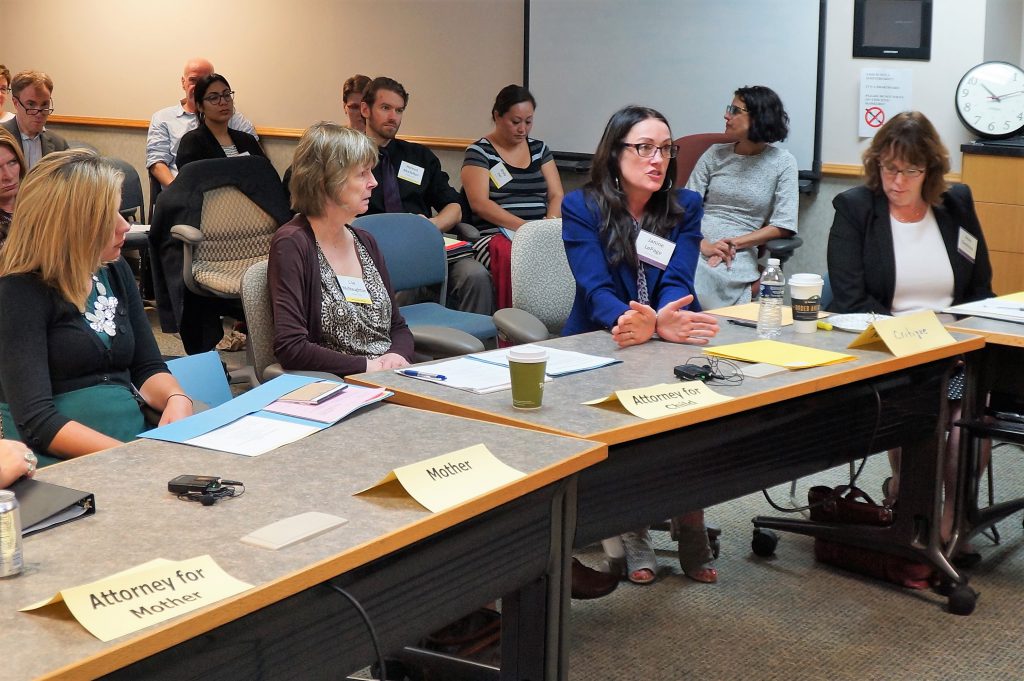 One morning in August, a roomful of people gathered at Mitchell Hamline to discuss the fate of a baby named Jackson. He was born to a mother with a history of drug abuse who was arguing she was equipped to retain custody and care for him. The judge heard testimony from the mother as well as a social worker. Others providing information included attorneys for both parties and the child’s father.
One morning in August, a roomful of people gathered at Mitchell Hamline to discuss the fate of a baby named Jackson. He was born to a mother with a history of drug abuse who was arguing she was equipped to retain custody and care for him. The judge heard testimony from the mother as well as a social worker. Others providing information included attorneys for both parties and the child’s father.
It was a lengthy hearing, with many perspectives shared.
It was also a simulation, a training exercise conducted by the Zero Abuse Project at Mitchell Hamline, in partnership with the Children’s Justice Initiative, as a way to improve emergency protective care (EPC) hearings in Minnesota. It was one of the first in a series of trainings, covering a wide variety of topics related to child protection and prevention of abuse, being implemented by the Zero Abuse Project.
“Educating professionals is a big contributing factor to seeing a decline in child abuse and neglect,” said Katie Olson, director of training for the Zero Abuse Project, which launched in the fall of 2017. “It is one piece of building a collaborative and restorative courtroom that supports and engages children and parents in the process, with the end goal of strengthening families so to end the cycle of abuse and neglect.”

Katie Olson
Representatives from three counties attended the August EPC training, and five more such trainings are scheduled for 2019. EPC hearings are incredibly important in the life of a child and his or her family, and participants said the training was a valuable opportunity to offer feedback to one another and to identify best practices.
It’s an example of the kind of work the Zero Abuse Project intends to do, Olson said. The goal, she said, is “having attorneys, social workers, judges who really understand what families have gone through, who understand what that perpetrator has gone through, so that even if they end up going to jail or a child ends up in foster care, or a parent ends up not having their kids anymore, that the system can still provide services to them to make their lives better.”
Two main pieces of the Zero Abuse Project’s training efforts will be an online certificate program and an annual conference in St. Paul.
The 12-week certificate program launches in the spring of 2019. It offers training in trauma-informed advocacy to professionals who work in legal systems. It goes beyond attorneys and judges to include social workers, guardians ad litem, probation officers, and others who serve in a courtroom or legal setting.
The conference is aimed at professionals in the legal system and in other fields who deal with children who have experienced trauma. The inaugural conference is Sept. 28 at the InterContinental Hotel. The keynote speaker is Dr. Bruce Perry, senior fellow at the Houston-based ChildTrauma Academy and adjunct professor in the Department of Psychiatry and Behavioral Sciences at the Feinberg School of Medicine at Northwestern University in Chicago.
In addition, the Zero Abuse Project is launching several initiatives including:
- On-demand webinars for CLE and CEU credit on topics such as vicarious trauma, racial disparities, and building trauma-informed organizations
- A monthly CLE series on how professionals can support and advocate for clients who have experienced trauma associated with homelessness, immigration, juvenile delinquency, and other areas intersecting with child welfare
- Training on how professionals in the child protection system can work toward reunifying families and achieving permanency quickly
- Programs on topics such as the effects of historical and generational trauma, ethical practices for attorneys working with trauma victims, and racial disparities within the child protection system
- Partnering with the Minnesota Department of Human Services on training for social workers
- Developing online courses for current law students relating to the constitutional rights of children and families, and how to advocate for trauma survivors in the justice system.
